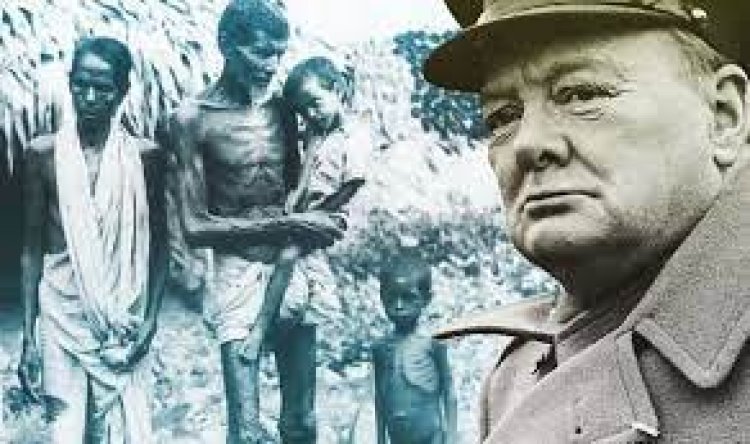Winston Churchill: Indian Oppressor vs. Western Saviour
This blog explores the contrasting views of Winston Churchill's legacy in Western countries and India, focusing on his role during the Bengal famine of 1943. It emphasizes the need to acknowledge this dark period in India's history.

Winston Churchill, a significant figure in world history, is the subject of differing views on his legacy. While in Western countries he is usually seen as a hero who fought against narcissism and for democracy during World War II, in India his name has a different connotation. In India, Churchill is blamed for the deaths of three million innocent people during the 1943 famine in Bengal.
The year was 1943, and the British were in charge in India. There was an acute famine in Bengal, with millions dying on the streets. Food costs soared, making important staples like rice unaffordable for the population. Villagers flocked to cities in search of food, even asking for boiling rice water. This disaster, known as the Bengal Disaster, was probably one of India's worst episodes.
Winston Churchill: Indian Oppressor vs. Western Saviour
Winston Churchill, usually portrayed as a savior in Western countries, is known for his uncompromising leadership during World War II. He led Britain at a critical time when Nazi Germany posed a serious threat to world democracy. Churchill's statements and determination have become symbols of resistance and bravery.
Looking at Churchill's involvement in India, especially during the famine in Bengal, a marked difference becomes apparent. In India, he is seen as a tyrannical character who ignored the misery of millions and prioritized the exigencies of war over the lives of innocent people.
The conflicting opinions about Churchill stem from the different interpretations of his actions and policies during this period. While the West focuses on his success in defeating Nazism, India emphasizes the disastrous effects of British colonialism and the negligent policies that worsened the famine in Bengal.
The Bengal Famine of 1943: Its Origins and Churchill's Response
The Bengal Famine of 1943 was a humanitarian disaster that occurred during World War II. The British strategy of withholding vital supplies to prevent the Japanese from invading India was primarily responsible for the food shortages in Bengal. To deny the Japanese any assistance, the British seized and destroyed anything that might help their opponents, including food supplies.
Meanwhile, food from Bengal was sent to Europe to feed the soldiers fighting in the war while the people of Bengal starved. Churchill, who was Prime Minister of the United Kingdom at the time, had a decisive influence on these decisions and actions.
Churchill was asked several times for food supplies to Bengal, but he refused because he feared jeopardising British supplies and the availability of ships for war aims. His failure to deal adequately with the grave situation in Bengal had disastrous consequences.
Churchill's bigoted views towards Indians compounded his actions (or lack thereof) during the famine in Bengal. He blamed the famine on the reproductive behavior of the Indian population, revealing a deep-rooted prejudice against the people he governed.
Remembering the Bengal famine and acknowledging its consequences are crucial.
The Bengal famine of 1943 and Churchill's involvement in it should not be forgotten or neglected. During this sad chapter in India's history, millions of innocent lives were lost, their lives snuffed out by ill-considered policies and goals.
Just as the Holocaust is memorialized to ensure that the atrocities of that time are never repeated, the three million Indians who died during the Bengal Famine are also important and should not be forgotten. Commemorating the Bengal Famine is not an attempt to demonize Winston Churchill but an opportunity to learn from history, reflect on the impact of colonial rule, and prevent future humanitarian disasters.
The different perspectives on Winston Churchill's legacy in Western countries and in India provide an interesting insight into the different understandings of history. While Churchill is considered a hero in Western countries for his participation in World War II, his actions and policies during the 1943 famine in Bengal cannot be overlooked. The people who lost their lives during the famine and the agony they suffered should not be forgotten.
We must strive to understand the complexity of history and recognize the darker chapters that shaped nations and affected millions of lives. This comprehensive knowledge will enable us to learn from the past and work towards a better future, where the well-being of all people is paramount.
Meanwhile…
You can just join our account management program and relax. We will make at least 1% profit for you on your account – Check out how by clicking on the link below.
Have fun trading!
Have a great journey, and may you catch some big waves on your way to prosperity!
To see this for real, click here.
https://www.myfxbook.com/members/SankarGanesan/tradefxp-trend-antitrend-day-trading/10404725
To read why you should be with us, click here
To open an account, click here.
To see our regulation certificate: click here.
To see our news with the IFMRRC: click here.
For claims, click here.
For the main site: click here.
For blogs and articles: click here.
Main Website: www.tradefxp.com



 admin
admin 










